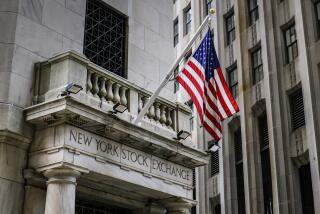Asia’s Markets Reopen on Shaky Ground
- Share via
Markets across Asia suffered the jitters early today, as traders moved to protect themselves from continued turmoil in Asian currency and equity markets.
In early trading in Japan, the Nikkei 225 benchmark stock index fell 272.33 points, or 1.57%, to 17,091.41 amid concern over the impact of last Thursday’s plunge in the Hong Kong stock market, which triggered a worldwide stock slump.
The Australian dollar slumped badly and Australian stocks fell 3.5% when the markets opened today, triggered by upheaval in gold prices and continued shakeout from last week’s market turmoil. Stocks were volatile in early trading in Singapore.
“It’s just getting worse and worse at the moment,” said Andrew McGill, a senior dealer at Chase Manhattan Bank Australia. “It’s starting to work its way up to North Asia and that would be bad news for Australia because we’ve got our biggest trading partners up there.”
The target of greatest anxiety today is Hong Kong, which is reeling from slumping property prices, shelved stock offerings and tighter credit. The main concern is the survival of the Hong Kong dollar’s peg to the U.S. dollar, and the high interest rates needed to defend it against speculative attack.
The sell-off at the New York Stock Exchange on Thursday and Friday hit companies that do business in Asia especially hard and left the Dow Jones industrial average down more than 130 points. A rebound in Hong Kong’s Hang Seng index Friday failed to restore investor confidence.
“The Hong Kong turmoil could continue and that could weigh on stocks and support bonds,” said Keisaku Ujihara, a manager at Sanwa Capital Management Co.
Across the globe, government officials urged calm. Chinese President Jiang Zemin, who arrived in Honolulu Sunday en route to a summit with President Clinton in Washington, told reporters before leaving China that investors should not lose their confidence in Asia.
“The economy of China, and this also includes the economy of Hong Kong, is stable. I completely believe that rational investors will not, because of changes in the stock market, lose their interest in the future economy of China and Hong Kong,” he said at a news conference.
In Washington, Treasury Secretary Robert Rubin pledged U.S. support for troubled Southeast Asian economies but said the governments involved must take responsibility for resolving this fiscal crisis by establishing “sound policy regimes.”
Asked on ABC-TV’s “This Week” whether Washington would consider a reprise of its response to Mexico’s 1994 currency crisis, when it bolstered the peso with a $50-billion loan package, Rubin said: “That is not envisioned here. The key participants here will be the IMF [International Monetary Fund] and the World Bank.”
The “Mai Tai hangover,” as it has been dubbed, began in July when Thailand was forced to devalue its currency and the problem quickly spread to its neighbors in Southeast Asia.
The Hong Kong government moved over the weekend to protect the former British colony from further attacks on the Hong Kong dollar by currency speculators. Hong Kong officials see the peg as vital to safeguarding the world’s confidence in Hong Kong’s economic stability under Chinese sovereignty. Even though the strong currency hurts tourism and exports, big business seems to agree that the peg must stay.
Australia was hit particularly hard today, with the dollar tumbling to a four-year low of 68.40 U.S. cents in early trading. In addition to the Asian currency problems, the dollar suffered from a plunge in gold prices triggered by a report by the Swiss government recommending Switzerland sell nearly half of its gold reserves. Gold is Australia’s second-biggest export after coal.
Australia’s currency had already slid more than 5 cents last week because of the Asian market woes.
More to Read
Inside the business of entertainment
The Wide Shot brings you news, analysis and insights on everything from streaming wars to production — and what it all means for the future.
You may occasionally receive promotional content from the Los Angeles Times.










